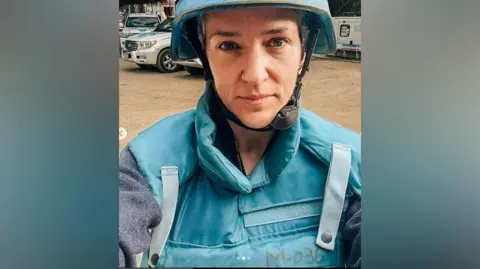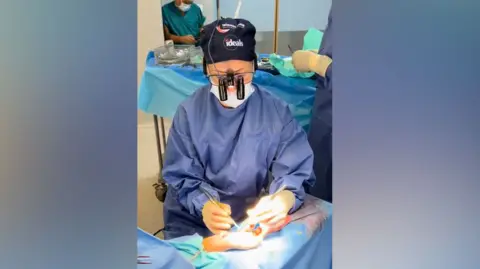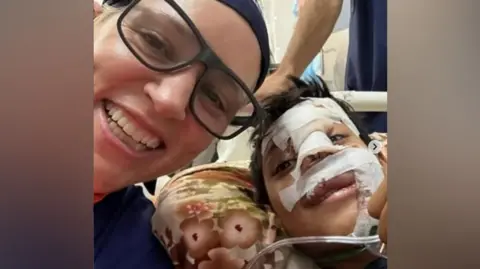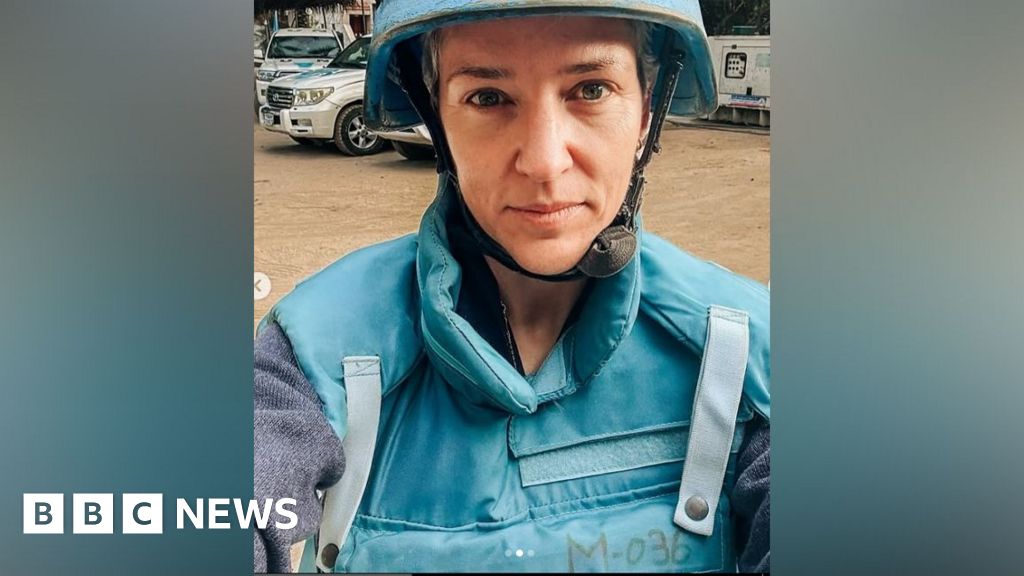 Victoria Rose
Victoria Rose
London-based surgeon Victoria Rose has been on three separate missions to Gaza to help people injured during the war
“I just want a ceasefire so that we can catch up,” Dr Victoria Rose tells her video diary filmed inside a Gazan hospital, as the casualties kept coming.
The consultant plastic surgeon recently took leave from her day job at St Thomas’ Hospital in London to work voluntarily in Gaza, helping victims of its war with Israel.
“Appalling” levels of malnutrition and starvation had set in by the time she visited in May, and the number of casualties rapidly increased, she tells the BBC.
“The mass casualties just didn’t stop. It was really shocking.”
At first, Miss Rose and her colleagues were mainly treating blast injuries – a “huge number” of severe burns as well as shrapnel injuries.
But towards the end of her stay, they became “totally absorbed with gunshot injuries,” she said. “That’s we really all we saw.”
It’s work she says is difficult, but she says that when she is in Gaza, she has no time to think about the level of suffering she sees.
“I’m just trying to get as much done as I possibly can in the very short amount of time that I have, so that we can make a difference.”
Miss Rose volunteers for the charity IDEALS (International Disaster and Emergency Aid with Long-term Support), which has been sending medics to the region since 2009.
“It is hard but you go in knowing what you’re doing… because of the lack of plastic surgeons in Gaza, you go in knowing that anything you do will make a big difference.
“So, I mean to just work and keep going.”
 Victoria Rose
Victoria Rose
Miss Rose operates to save the hand of a nine-year-old girl who was injured in an explosion in August last year
She was deployed to Nasser Hospital in southern Gaza, the same hospital that was hit in a series of deadly Israeli attacks last week.
There, her team took over the ground-floor theatres, performing plastic surgery around the clock throughout their 28-day stay.
Miss Rose described working late into the night, in difficult conditions.
She said that with limited access to food, the team survived largely on energy bars and packets of dried food they had brought with them.
A lack of fuel meant the hospitals had to ration the use of energy, so they could not use the air-conditioning system.
In addition to deadly airstrikes and gunfire, Palestinians are also at threat from disease due to poor sanitation as a result of the war, Miss Rose says.
This has led to a large rise in illness, she told BBC London.
The “most disturbing” among them, she says, is an increase in cases of flaccid paralysis – a disease which sees the immune system attack the body’s nerves, eventually leading to paralysis and death.
“Usually Gaza would see a couple of cases a year, but in the last month they’ve had 37 cases in people under the age of 15,” she says.
‘Really shocking’
She has now made three trips to Gaza since war broke out in October 2023.
Each time she has returned, Miss Rose feels the situation there has seemed to become more desperate.
“To see (the country) disintegrate into this refugee camp was really, really shocking for us,” she said.
During her first visit in March 2024, she worked in the European Gaza Hospital, where she found ordinary citizens taking shelter.
“All the gardens were full of tents… as you walked down the corridors there would be areas walled off with carpets and sheets and there’d be entire families living behind them on a couple of mattresses on the floor.
“And that was really surprising at that stage, the level of disruption that had happened.”
When she arrived back in Gaza in August 2024, she was shocked by the extent of physical damage the war had brought.
“It was like going through the set of a moonscape film or something. There was no structures standing.
“When we entered, we didn’t see life for the first 15 minutes of the drive.”
 Victoria Rose
Victoria Rose
Victoria Rose with one of her patients in Gaza in August 2024
Many hospitals in Gaza have been attacked by Israel since the war began, and Miss Rose says people are finding it difficult to access aid.
Israel maintains that Hamas uses hospitals and other civilian infrastructure to shield its fighters – an accusation Hamas denies.
Miss Rose said that now she is home, she struggles to watch news coverage of the war.
Instead, she wants to focus on future missions, and raising funds to keep them going.
IDEALS continues to send a team to Gaza every month, but says it’s becoming harder for medics to access the region.
“I would love to go back, but I am fairly confident my application is going to be denied when I next try,” she said.
Her family do not want her to return to the warzone.
“They’ve been through quite a lot of stress over the work we’ve been doing… and it becomes very difficult to put people through that.”

